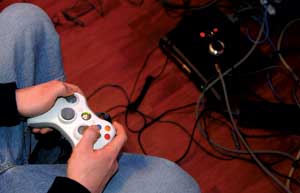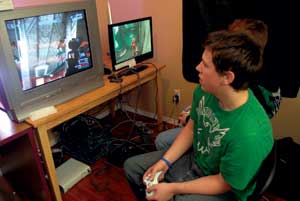Video games aren’t usually fun for Chad Bowman. They’re certainly not relaxing. They are a vigorous means to an end, a focused and occasionally strenuous form of training for a greater goal. That goal is to earn his professional status in Major League Gaming. The means is Halo 3, a futuristic war game that is as complex as it is important in competitive video gaming circles.
Bowman, a senior at Glacier High School, is a member of the four-person videogaming team named Immortal Persistence. The others are Justin Murray, a freshman at Glacier, his older brother Jesse Murray, a senior at Glacier, and Andrew Gorton, who graduated from Flathead High School last year. They play Halo 3 up to 60 hours per week, referring to the time spent as training.
During a slow week, where school and other obligations dig into their Halo 3 time, the boys might train as little as two hours a day. They practice in a room – or “training facility” – at Bowman’s house. The room has four televisions, including two official MLG Viewsonic monitors, and chairs, with not much else. On weekends, when they’re not sleeping or eating, they’re playing Halo on Xbox 360. If their schedules and wallets permit, they travel to MLG tournaments in places like Seattle and San Diego.
 |
|
Andrew Gorton’s fingers expertly flick the Xbox 360 controller as he practices Halo 3 with his team. |
“You wake up and grab the controller,” said Bowman, who describes turning professional as his ultimate dream. “You’re still groggy but you have to play serious.”
Bowman is a smart kid. He maintains a 3.5 GPA at school, taking two advanced placement classes, and plans to study chemical engineering and quantum physics at Montana State University. But first, he plans to take a year off of school after high school graduation to work and train. Working will give him the money necessary to travel to the distant tournaments, and training will give him the necessary skills to hopefully, along with his teammates, launch his professional career. The boys are currently considered amateurs.
“This is a real hard road to take,” Bowman said. “You don’t get much support from the community.”
To listen to Bowman describe what’s happening onscreen, as well as what he’s doing with the controller in his hand, is a glimpse into a world that’s difficult for an outsider to understand. Bowman said while he’s playing in the four-on-four online competitions, which allow his team to play against other teams from around the nation, his mind is constantly absorbing and computing far more thoughts than it is, say, during school.
Players must be aware at all times of their own actions and strategy, as well as the whereabouts of their teammates and opponents. The action onscreen is nonstop and the teammates shout out warnings and directives at each other throughout the games. Sometimes they wear official headsets with microphones. Bowman said it’s like a rapidly moving chess game where one must process “thousands of pieces of information.”
 |
|
Jesse Murray, front, and Andrew practice Halo 3 with their team in Kalispell. Players have their own Xbox 360, controller and television. The television on the right is the standard television for major league gaming. |
“It takes an incredible amount of the subconscious,” Bowman said. “You can’t render that with your conscious.”
Each of the boys on Immortal Persistence makes his goal clear: professional MLG status. Professionals stand out in gaming circles as enviable models of success, not to mention they garner sponsorship money. Then there’s the coveted prize money. At the recent end-of-the-year MLG National Championships in Las Vegas – MLG has seasons just like other sports – the winning team Str8 Rippin won $100,000 as the top team. The second-place team won $60,000.
Millions of people, mostly teenagers, play Halo 3, so it only seems natural that an organized league exists. Other MLG events include Rainbow Six Las Vegas 2 and Gears of War, but Halo 3 is the biggest. ESPN live-streamed the Las Vegas tournament, which of course the members of Immortal Persistence watched. That’s where they want to be someday.
The boys are aware that some people stereotype them. They’re comfortable with that, though they say the perceived stigmas attached to video games decrease every year as the activity becomes more ingrained into our culture. Bowman said he doesn’t get any flack from his peers and his family has been supportive, with his dad even taking up Halo.
Bowman said he is competitive by nature, and video games are the best venue for him personally to exercise that competitive streak. He has played video games for most of his life, though competitively for only the past couple years.
“It could have been any sport, anything with competition,” Bowman said. “It just happened to be video games.”